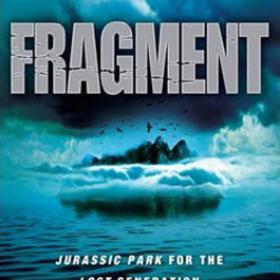Fragment By Warren Fahy

3/5
Almost exactly a year ago Michael Crichton, famed science fiction author, tragically passed away causing dad’s everywhere much consternation. Who, they wondered, could possibly step in and provide them with trashy sci-fi stories sprinkled with bits of hard science factoids with as much skill as Crichton? Well, with the publication of Fragment, the debut novel of Warren Fahy, the race to replace him has officially begun. And if you’re going to launch your career off the back of another book then a nonchalant rip-off of Jurassic Park is as good of place as any to start.
The adventure begins when a group of self-absorbed reality TV stars, who are filming their nautical trip around the world for a show called SeaLife, stumble across a mysterious island that has remained totally isolated for hundreds of millions of years. The crew find out rather quickly that this ecosystem is filled with blood thirsty creatures that have never been seen before by man.
Fahy as a writer seems to be about on par with Crichton although he still needs to learn to control his flights of fancy. A massive percentage of this book is gobbled up with intricate yet confusing descriptions of creatures that go by names such as "Spiger" and "Shrimpanzee." He even includes sketches of a few in case your imagination doesn’t want to do the work for you.
Clearly Fahy had a blast in coming up with these monsters and letting them loose on human prey, but frolicking around in your own little world rarely makes for great literature. It is uncertain if the rest of his writing is just not up to snuff, or if he was trying to dumb the book down for a particular audience, but the story feels childish and lacks significant depth. This is his first book, remember, so we’re going to cut him some slack, but if he expects to survive in this industry he’s going to have to sharpen his tools.
Also competing for page space are two rival scientists. Geoffrey is a commitment phobic sensationalist who has been plugging his new theory that death is nature’s way of preventing incest. Then there’s Thatcher, more money making machine than respected authority, and a man with both eyes focused on winning a Pulitzer, even if that means sacrificing his credibility. His theory, rather more cynical, says that intelligent beings must destroy their environment to thrive and that global warming is his proof.
Together they fly in to work as consultants to the President as he tries to decide whether the entire island should be nuked. To his credit Fahy doesn’t casually expect his readers to take the side of the imperialistic humans. All life on Hender’s Island (as it’s called) is considered sacred, no matter how much blood it has in its teeth. Then, just when you think you have the whole thing figured out, Fahy takes a surprise detour and turns his novel into a soft, gooey pile of sweetness.
When it suits him, of course, he’s more than happy to slide back into the more gruesome aspects of his story but the moral conundrum that the characters suddenly find themselves in is enough to make the last 100 pages an enjoyable, pulpy read. Fahy is too ambitious to simply parrot trite messages such as "reality TV is stupid" or "humans are bad for the planet," but he does find time to make it known that he believes those things.
From here he needs to figure out a way to blend those big ideas and his wealth of scientific knowledge a little more seamlessly with the fictional story element that he’s telling. Most of Crichton’s book found themselves on the big screen in the form of huge Hollywood blockbusters. The best that Fragment can hope for is to one day be turned into a made for TV movie that airs on the SyFy channel, and that’s if it’s really, really lucky.
Author: Warren Fahy
Pages: 356
Publisher: Delacorte Press
2 Comments
Leave a comment
RELATED ARTICLES
Get the most-revealing celebrity conversations with the uInterview podcast!





Dear Mr. Roberts,
I fail to see how you could get from my novel that I believe human beings to be bad for the planet, when it is the villain of the story who espouses such an idea and the heroes of the story who prove him wrong. However, thanks for reading FRAGMENT and I’m gratified that you derived some enjoyment from the experience.
Sincerely, Warren Fahy
Hello–
Thank you for reading my review and taking the time to comment on it.
As for my view that it was your view that humans are bad for the planet. I will admit that perhaps I projected myself into the blank spaces and possibly jumped to conclusions but I did spend a decent amount of time thinking about the message of the book before stating it in my review. Thatcher, villain or otherwise, is given an endless supply of strong speeches and strong points on the negative impact humans have had and will continue to have on Earth. In contrast to that the heroes of this story, I assume them to be Nell and Geoffrey, are given as their proof that intelligent beings will not destroy their environment a made up creature who lives on a made up island.
I also don’t automatically believe that a hero always speaks for the authors. There are other more commercial reasons a character could be a hero and best I can tell “humans are good” and “we shouldn’t nuke Hender” would probably sell better than the opposite. My favorite thing about this book was the way in the reader was left to decide for themselves what would be the best course of action. Nell and Geoffrey may have had their moral compasses tuned in to one direction but I never once felt condescended to. I myself, never a fan of preemptive strikes, was all in favor of pushing the button to shock and awe Hender’s Island off the map. But in the end if you were going for a pro human approach then I misread.